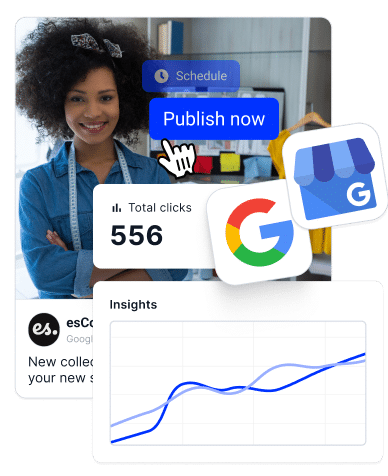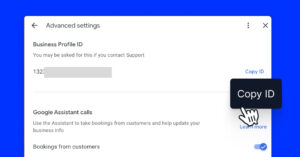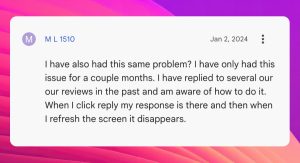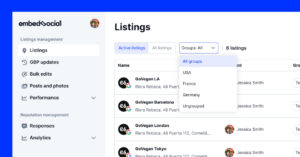If you’re thinking responding to reviews doesn’t really matter, think again.
Engaging with online reviews is more than managing customer relationships—it’s also a key factor in boosting your business’s SEO performance, especially on Google.
Customer engagement is a significant ranking factor since it sends out signals that your business is active, engaged, and cares about its customers—all of which are qualities that Google values highly when determining local SEO rankings.
So, how exactly does replying to customer feedback impact your SEO, and what can you do to maximize these benefits? In this blog post, I dive in and explore how responding to reviews can give your business the visibility boost it needs this year.
Why does responding to reviews matter?
According to consumers, businesses that respond to reviews are seen as 1.7X more trustworthy than businesses who don’t (76% vs. 46%). Not only does responding to reviews support trust-building, it also gives you an opportunity to humanize your business, show customers you care, and demonstrates professionalism.
Google/Ipsos Connect, Benefits of a Complete Google My Business Listing, October 2016. A total of N=15,904 adults 18-64 (Source).
Here’s why responding to reviews isn’t just about customer service but a powerful way to show search engines and customers that your business is trustworthy:
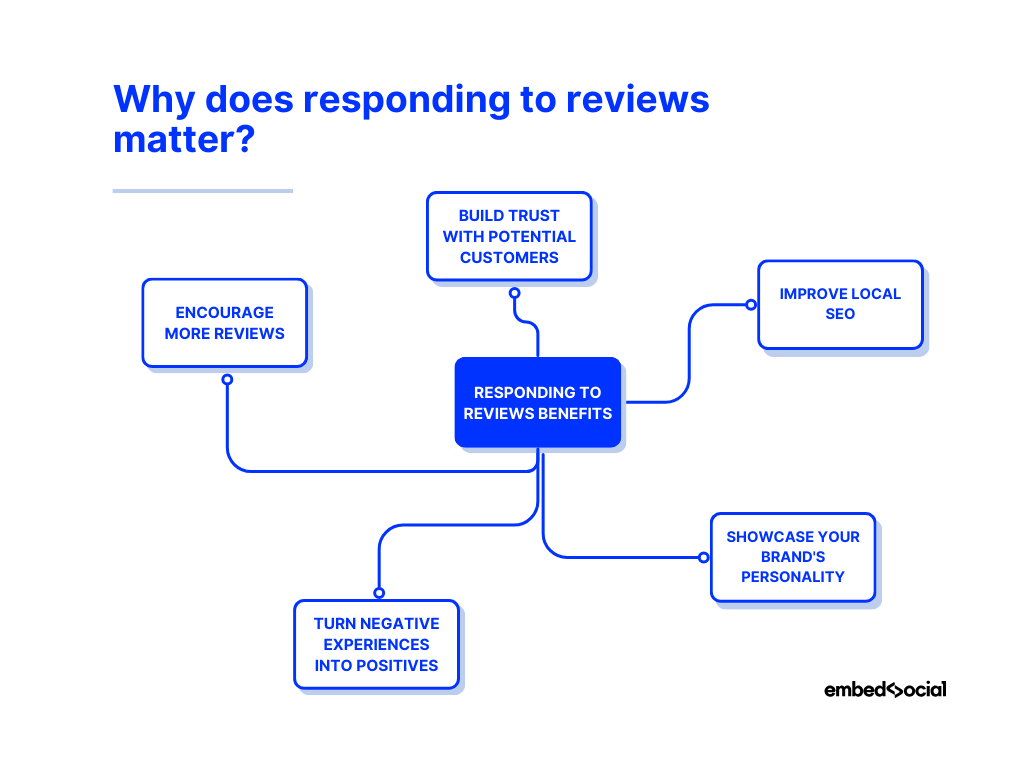
- Build trust with potential customers – responding to Google reviews shows that you care about customer experiences, helping build a positive online reputation;
- Improve local SEO – Google sees active engagement as a ranking factor, so responding to reviews boosts your SEO metrics visibility in local search results;
- Showcase your brand’s personality – your responses provide an opportunity to demonstrate your brand’s voice and values, making a lasting impression;
- Turn negative experiences into positives – thoughtful responses to negative reviews convert unhappy customers into advocates and mitigate brand damage;
- Encourage more reviews – people are more likely to leave positive reviews if they see that you actively respond, leading to even more engagement.
Ultimately, responding to reviews is an essential business practice that improves customer relationships and boosts visibility online.
How do online reviews fit into Google’s ranking factors?
In search results, Google considers many ranking factors when deciding where a business will appear. The main ones are the meaning of your query, the content quality and relevance, and how usable the content is for your search history and context.
That said, there are additional factors that Google considers, including user experience, backlinks, and, most importantly in this case: online reviews.
Reviews are seen as a reflection of your business’s quality and credibility. Therefore, by actively responding to reviews, you demonstrate that your business is attentive and values customer feedback. This engagement tells this review site that your business is trustworthy and active—two essential qualities for higher local search rankings.
Additionally, reviews provide fresh, user-generated content that includes keywords related to your products, services, and even your location, which helps Google understand what your business offers, and responding to those reviews further reinforces this.
Moreover, a positive review—and the way you handle a negative review—contribute to building trust, which can influence how Google perceives your business and, consequently, how prominently it is featured in Search and the Google Local Pack.
At the end of the day, your review quantity, frequency, diversity, and responses are all crucial factors when it comes to climbing Google’s search pages.
SEO benefits of responding to reviews
However, engaging with reviews does more than just build customer trust—it provides numerous SEO benefits that can boost your business’s visibility in search results. Here are the key ways responding to reviews helps improve your ranking:
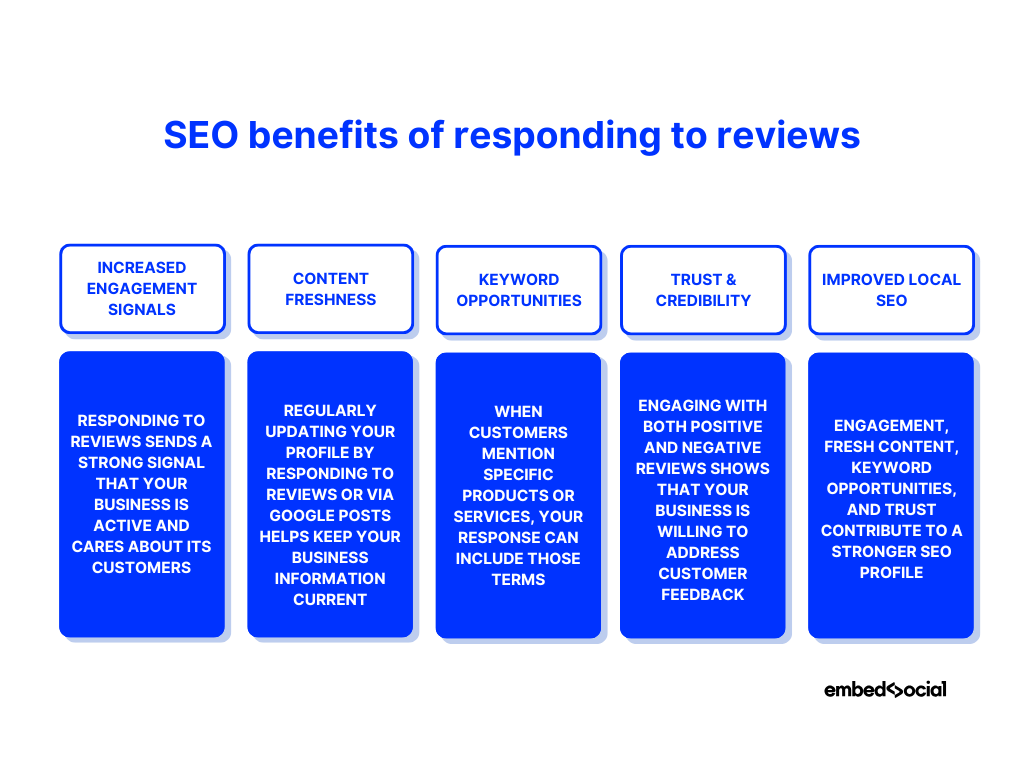
Increased engagement signals
Google values active engagement, and responding to reviews strongly signals that your business is active and cares about its customers. Every Google review response you post counts as fresh engagement, which can help improve your ranking in local search results. The more engagement your business profile has, the more appealing it becomes to search engines.
Content freshness
When you respond to reviews, you’re adding fresh content to your Google Business Profile. Google loves updated and fresh content, which signals that your business is active. Regularly updating your profile by responding to reviews or via Google Posts helps keep your business information current, making it more likely that Google will boost your profile in local search results.
Keyword opportunities
Google review responses are a great opportunity to naturally include relevant keywords—like your products, services, or location—into your Google Business Profile.
This helps reinforce the key terms that your business wants to rank for. When customers mention specific products or services, your response can include those terms, further strengthening your business’s connection to relevant search queries.
Trust & credibility
Search engines prioritize trustworthy businesses, and responding to reviews is an effective way to establish that trust. Engaging with both positive and negative reviews shows that your business is willing to address customer feedback, which improves credibility in the eyes of potential customers and search engines, ultimately leading to better rankings.
Improved local SEO
All of these factors—engagement, fresh content, keyword opportunities, and trust—contribute to a stronger SEO profile, and your local SEO audit would show this.
How to respond to reviews to maximize SEO benefits
Responding to reviews effectively can significantly boost your local SEO. Follow these steps to ensure your responses work towards improving your online visibility.
Step 1: Prepare a quick response
Timely responses indicate that your business is active and engaged.
Aim to reply to customer reviews within 24-48 hours. Google values businesses that maintain active profiles, and prompt responses can help reinforce this.
Step 2: Use relevant keywords naturally
When replying, include keywords relevant to your business—such as product names, services, or your location—where it feels natural.
For example, if a customer praises your “Italian cuisine in New York”, incorporate that phrase into your response to strengthen keyword relevance.
Step 3: Maintain professionalism & positivity
Always keep your tone professional and friendly, even for scathing reviews. Remember, you only have to find ways to delete Google reviews that are spam or fake.
As for responding to negative reviews, a positive, empathetic response shows potential customers that your business is committed to customer satisfaction.
Step 4: Personalize your response
Take the time to personalize each response to show that you value customer feedback. Mention specific details from the customer’s review. This level of personalization demonstrates genuine engagement, both to the reviewer and to Google.
Step 5: Address concerns & offer solutions
If a review contains complaints, acknowledge the customer’s concerns and offer solutions. This shows excellent customer service, helps mitigate negative feedback, and demonstrates that your business is proactive in improving the experience.
Step 6: End with a call-to-action
Encourage continued engagement by adding a CTA at the end of your response. It can be as simple as “We’d love to see you again soon!” or “Feel free to reach out if you need anything else.” This prompts satisfied customers to return, which increases engagement.
Bonus step: Use review management platform to respond to Google reviews
One of the best things you can do when it comes to responding to Google reviews or feedback from other review sites is to subscribe to a robust review management tool like EmbedSocial. This comprehensive platform generates, manages, and provides a tool to respond to Google reviews for multiple locations.
The responder is built for large brands with lots of Google business profiles, allowing them to see and manage reviews in one place, with the chance to respond to each of them without the need to login to each account separately.
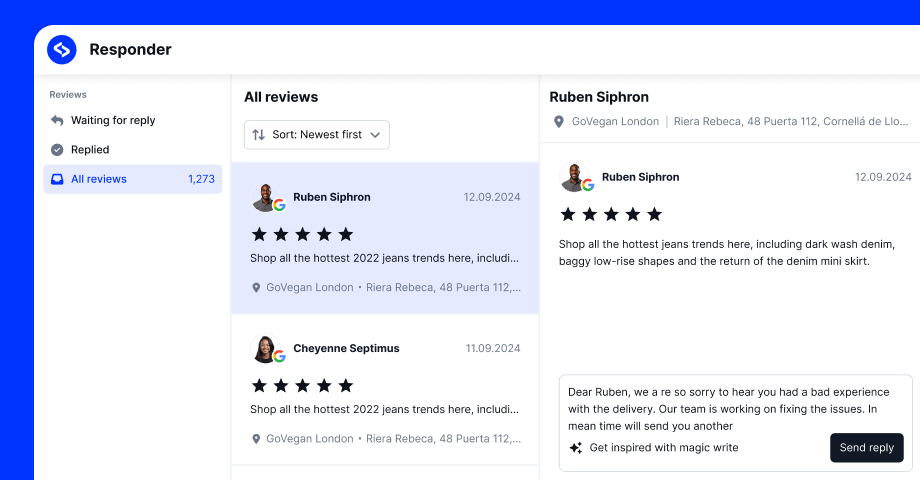
Some of its standout features include the following:
- Highly customizable review widgets—change your review widget to fit your brand image thanks to lots of templates, customization options, and a custom CSS feature;
- Embed your review widgets anywhere—EmbedSocial’s widgets work with almost every modern website builder out there and they don’t require coding knowledge;
- Mobile-responsive review widgets—since the future of search is mobile, we’ve ensured that our widgets look great on any digital screen out there;
- Advanced moderation options—you can choose exactly which reviews you want to showcase or set up filters based on keywords, review rating, and more;
- Various review collection methods—get reviews by email, embed a “Leave a review” button, or send out detailed surveys—you choose how to get feedback;
- Embed aggregated star ratings in Google—you can quickly and easily signal to Google to showcase your product’s star ratings in Search results;
- Various AI-powered features—need tools to summarize your feedback’s overall sentiment, craft tone-appropriate responses, and more? We got that.
Additionally, using an autoresponder for Google reviews can help increase the average response rate, especially by responding to reviews that have a small star rating like 2 or 1 star. These responses to negative reviews can be automated, so they appear very fast, such as a reply stating to the user to contact a customer success number immediately or a complaint to write to a specific email.
Hi [Customer’s Name],
Thank you for taking the time to share your feedback with us. We’re sorry to hear about your experience and want to make things right.
We’d love to learn more about what happened and how we can resolve the issue for you. Please reach out to our support team at [Support Email/Phone Number], or if you prefer, you can send us a direct message here with more details.
Your satisfaction is important to us, and we appreciate the opportunity to improve.
Looking forward to hearing from you!
Best regards,
[Your Name]
[Your Position] at [Your Company]
Read more below about why improving the average response rate can impact your SEO and ranking in Google Maps.
What is Google’s review response rate and time?
To help businesses remember to respond to reviews, Google regularly updates them on their response rate and average response time via a simple message:
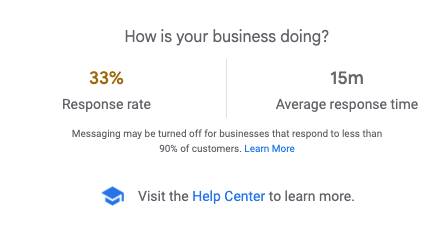
For instance, the above user has a response rate of 33%, which could and should be improved, and an average response time of 15 minutes, which is great!
Since you know that you should respond to every review you receive, you should keep your response rate as close to 100% as possible.
As for the average response time, I advise you to try and respond to new reviews within a day of receiving day. As always, high response rates signal engagement and active profile management to Google—a big SEO boost!
Tactics to increase average response rate and time
Increasing your response rate and ensuring timely replies can be improved with a few sound tactics, including but not limited to the following:
- Enable notifications – get real-time alerts for new reviews, so you can respond promptly;
- Use templates – streamline the response process while allowing customization to make each reply unique;
- Delegate responsibilities – assign team members to monitor and respond to Google reviews, ensuring no feedback is missed;
- AI assistance – use AI tools for simple response tasks to improve efficiency and maintain a high response rate;
- Schedule regular reviews – set aside time weekly to address any reviews, keeping response times fast.
Sounds time-consuming? EmbedSocial helps you with all of the above!
Benefits brands experience from responding to online reviews: Roundup of 25 expert opinions
When asked how and if responding to online reviews helps brands, thought leaders had quite a few words to share. Here are 25 valuable quotes:
- Boost SEO by engaging with reviews
- Create fresh content with review responses
- Foster trust by addressing feedback
- Improve SEO with tailored responses
- Enhance visibility through active engagement
- Build trust and improve SEO
- Increase local search rankings
- Boost engagement and SEO
- Enhance SEO with keyword integration
- Improve local search visibility
- Respond to reviews for better SEO
- Strengthen SEO with review engagement
- Optimize keywords in review responses
- Engage customers to boost SEO
- Improve SERP snippets with responses
- Build trust and SEO through engagement
- Encourage loyalty with review replies
- Increase organic traffic with review responses
- Boost local visibility by responding
- Enhance SEO with active review management
- Improve rankings with review engagement
- Boost SEO by building online reputation
- Increase trust and SEO with responses
- Leverage reviews for keyword strategy
- Foster confidence with human responses
Boost SEO by engaging with reviews
Responding to Google reviews has been a game changer for both building relationships and boosting our SEO. Engaging with reviews—whether they’re glowing or critical—signals to search engines that our business is active and customer-focused. This engagement helps improve our local search rankings, making us more visible when people look for yoga or wellness services in our area. Plus, by incorporating relevant keywords in our responses, like “private yoga sessions” or “corporate wellness,” we can subtly reinforce what our brand is all about.
It’s also an opportunity to show our personality and values. When I take the time to thank a client for their feedback or address a concern, it shows we genuinely care, which strengthens our reputation. This kind of interaction can encourage more people to leave reviews, creating a cycle of engagement that further boosts our online presence. Overall, responding to reviews has been one of the most authentic ways to improve SEO while connecting more deeply with our community.
Shayna Hasson, Co-Founder & CEO, Yoga Beyond The Studio
Create fresh content with review responses
Responding to your Google (and other) reviews is like a little SEO secret weapon that most people overlook! Here’s why it works:
First off, every time you respond to a review, you’re creating fresh content on your Google Business Profile (or wherever the review lives). And Google loves fresh content. The more active your profile is, the more Google sees your business as relevant and engaging, which means they’re more likely to push you higher in search results.
Second, responding to reviews—whether they’re good, bad, or ugly—shows people (and Google) that you’re an active, trustworthy brand. And guess what? Trust plays a huge role in how Google ranks businesses. When potential customers see you taking the time to respond, it builds credibility and makes them more likely to choose you. Google notices that too, and they’ll reward you for it.
And here’s the kicker—local SEO! If you’ve got a local business, reviews are a goldmine for boosting your local rankings. When you respond to reviews that mention your location or specific services, you’re reinforcing your local presence. This helps Google understand exactly where you are and what you offer, making it easier for local customers to find you.
So, in short—engaging with your reviews doesn’t just make you look like a rock star to your customers, it also gives your SEO a serious leg up. And who doesn’t want to climb those search rankings, right?
Foster trust by addressing feedback
One effective but usually underused approach to improving your business’s SEO is responding to Google reviews. Interacting with client comments not only fosters confidence but also tells Google your company is active and focused on customers. Local search results could grow as Google’s algorithm promotes companies that give interaction top priority.
I have personally experienced how tailored answers can turn a bad review into a favorable customer experience. For example, resolving a complaint about delayed services garnered a loyal client who subsequently recommended others.
To take advantage of this, reply quickly, organically include appropriate keywords in your responses, and inspire additional reviews by proving your dedication to client satisfaction. Recall that each review is a chance to improve your trustworthiness and web presence. In the end, real involvement builds confidence—a great advantage in the digital terrain of today.
Rohit Vedantwar, Co-founder & SEO Expert, Supramind.com
Improve SEO with tailored responses
Responding to Google reviews, especially when you include relevant keywords connected to your service or product, is an excellent way to improve your SEO. By doing so, you give search engines like Google more context about what your business offers, enhancing your brand and services. It shows Google that you’re not only active and involved, but also provide value to your customers.
Jemma Wiltshire, Business Owner, Jemma Wiltshire Design
Plus, fast responses to reviews, positive or negative, will showcase a strong dedication to customer service. This kind of interaction reflects positively on the business itself, increasing your online visibility and building confidence with search engines and prospective customers. Regularly responding to reviews can also help promote a positive brand image, promoting more consumer engagement, and ultimately encouraging more traffic to your website.
Enhance visibility through active engagement
Google has said that responding to reviews helps with local search rankings. When you engage with customer feedback, you’re telling Google your business is listening and values customer input. This positive engagement will get you more visibility in local search results.
By including relevant keywords in your responses, you’re adding more content for search engines to index. This will help associate your business with products, services, or locations.
Responding to reviews encourages more customer interaction, which can lead to:
- Longer time on your Google Business Profile
- More clicks to your website
- More customers leaving their own reviews
These engagement metrics are positive signals to search engines about your business’s relevance and popularity.
Each review and response creates new, unique content on your business profile. Search engines love profiles that are updated frequently with fresh content, so you may get more visibility in search results.
Not a direct SEO factor, but responding to reviews builds trust with potential customers. More trust means more clicks from search results and more time on site—both positive SEO signals.
Ahmad Nahle, Head of Sales & Marketing, Rugged Books Inc
Build trust and improve SEO
I’ve found that responding to Google and other online reviews has many benefits for my brand’s SEO and online presence. Engaging with reviews helps my brand in several ways:
- Better Local SEO: By engaging with customer reviews on Google, I’m showing Google I’m an active business. Google sees the activity and engagement around my business listing as a sign of a well-managed online presence. This can improve my local search rankings so customers can find me when they’re searching for services or products in my area.
- Better Customer Trust and Perception: Responding to reviews—positive or negative—shows I value customer feedback and customer satisfaction. This responsiveness builds trust with potential customers who see I engage with existing customers. It shows I care about their experience and will address concerns, and positively impacts customer perception.
- More User Engagement: Engaging with reviews means more user activity on my business profile. While the direct SEO benefits are debatable, more engagement means better visibility and user trust. This indirectly helps my SEO by increasing click-through rates and time on site.
- Keyword Integration: When I respond to reviews, I can naturally integrate relevant keywords into my responses. I just make sure not to over-optimize to keep it genuine.
- Reputation Management: Addressing negative reviews quickly helps to mitigate damage to my brand reputation. By resolving issues publicly, I show accountability and a commitment to improvement, which helps my brand image.
Overall, while the direct impact of responding to reviews on SEO rankings is debatable, I believe engaging with reviews supports broader SEO strategies. It’s engagement, trust, and customer relationships which all help my brand online.
Jorge Argota, Digital Marketing, Jorge Argota
Increase local search rankings
Responding to Google reviews has been a key part of my SEO strategy, and it’s something I always advise my clients to do as well. Not only does it show customers that I’m engaged and value their feedback, but it also gives a real boost to SEO efforts. When I take the time to reply to reviews, I make sure to include keywords that relate to my service or product, and the location I’m trying to rank for.
For example, if I want to rank for “web design services in London,” I’ll naturally mention “our web design services” and “London” in my responses. This helps Google better associate my business with those keywords, which improves my local search rankings. Over time, this consistent use of relevant keywords signals to search engines that my business is closely tied to those terms, making it more likely to appear in local search results.
It’s something I stress to clients too—responding to reviews isn’t just about customer service; it’s an easy and organic way to build up SEO. Plus, it creates a better connection with your audience, showing that you care about their experience, which can only benefit your brand in the long run.
Alexander Hill, Founder & Director, AH Web SEO
Boost engagement and SEO
Engaging with online reviews helps establish credibility among prospective customers. This practice not only directly influences your search engine visibility, but also shapes visitors’ perceptions before they enter your website, providing external validation. When users feel confident about your brand, they’re more inclined to respond to calls to action and spend more time on your site. This increased engagement positively affects user signals, ultimately improving your website’s SEO performance.
Villiam Karasti, SEO Consultant, Pardott Marketing
Enhance SEO with keyword integration
Responding to Google and other reviews can significantly help your brand’s SEO by improving both local search rankings and overall online visibility. Search engines like Google value engagement and responsiveness as part of their ranking algorithms, particularly for local businesses. When you respond to reviews, it signals to search engines that your business is active, engaged, and attentive to customer feedback, which can positively impact how your business is ranked.
Here’s how responding to reviews helps your SEO:
- Improved Local Search Rankings: Google My Business (GMB) is a key factor in local SEO, and reviews are a crucial element of your GMB profile. When you regularly respond to reviews, it shows Google that you’re actively managing your business profile, which can boost your local search ranking. The more positive interaction you have with your reviews, the more likely Google is to view your business as credible and authoritative in your area.
- Increased Engagement Signals: Engaging with reviews creates fresh, relevant content that search engines crawl. Each time you respond to a review, you’re adding unique content to your profile, keeping it active and dynamic. This engagement increases the chances of your business appearing in search results, especially for local and voice searches.
- Boosts Keyword Relevance: When responding to reviews, you can naturally include relevant keywords (without overdoing it) that are associated with your business, services, or products. For example, if a customer praises your service, you can thank them and mention your specific service. These keywords can help reinforce your relevance for certain search terms, helping search engines associate your business with those keywords.
- Building Trust and Reputation: Responding to reviews, especially negative ones, shows potential customers that you care about feedback and are proactive in addressing concerns. This not only boosts your online reputation but also increases the likelihood of positive reviews in the future, which in turn improves your SEO.
That said, consistently responding to reviews enhances engagement, signals relevance to search engines, and boosts your credibility—factors that contribute to better SEO performance. By fostering a positive feedback loop of engagement and visibility, you’re actively strengthening your brand’s online presence.
Sandra Stoughton, Director, Marketing Operations, TruBridge
Improve local search visibility
When you engage with reviews, whether they’re good or bad, you show Google that your business is active. This kind of activity boosts your profile’s visibility, making your business more likely to appear when people search for services near them.
Take, for example, a local SEO agency that helps small businesses rank higher on Google Maps. They noticed that when their clients responded consistently to reviews, they saw a clear improvement in their rankings.
The agency advised businesses to thank customers for positive feedback and, importantly, to respond professionally to negative reviews too. By offering solutions and showing they care, these businesses created more engagement on their profiles, which Google values.
On top of that, the agency made sure their clients’ name, address, and phone number (NAP) information was consistent across all online directories. Keeping this data uniform reinforced the business’s credibility in Google’s system.
Over time, the businesses that kept their NAP data accurate and actively responded to reviews noticed a real boost. Their profiles ranked higher, leading to more traffic and, ultimately, more customers.
Ramzy Humsi, Founder & CEO, Vortex Ranker
Respond to reviews for better SEO
Responding to your Google reviews really does help your SEO.
First, Google itself actually recommends responding to reviews as a tactic to improve your local SEO. If Google explicitly says something works, you’d better believe it’s worthwhile.
Second, it demonstrates that you value customer feedback. Not only does this make your reviews more impactful, but people may also be more likely to leave a review if they know it’s something you actually read and respond to.
You can even turn negative reviews into a benefit by responding quickly in a friendly tone and providing a solution to their issue. Many people specifically look for one-star reviews, so by fixing any issues, you can actually demonstrate that you take any potential problems seriously.
At the end of the day, Google wants to show people the best businesses. By responding to reviews, you’re proving that you care about customer feedback, which indicates to Google that you’re a reputable and high-quality business.
Isaac Justesen, Founder & CEO, PatientPartners
Strengthen SEO with review engagement
Responding to Google reviews is like tending to a digital garden—it nurtures your online presence and helps your brand bloom in search results.
First off, it signals to search engines that you’re an active, engaged business. Google loves to see this kind of interaction. It’s like giving your SEO a little boost without even trying.
But here’s the real kicker—responding to reviews gives you a chance to naturally include keywords. When we reply to a client praising our “responsive web design,” we’re reinforcing that term in connection with our brand. It’s subtle but effective.
Plus, it’s not just about Google. We’ve seen similar benefits on platforms like Yelp and Facebook. Each response is another opportunity to showcase your brand voice and expertise.
Remember, though, it’s not just about SEO. It’s about building relationships. A thoughtful response can turn a good review into a loyal advocate, and even help mitigate the impact of a negative one.
In the end, responding to reviews is a win-win. It boosts your SEO and your customer relationships. That’s what I call smart digital marketing!
Harmanjit Singh, Founder & CEO, Origin Web Studios
Optimize keywords in review responses
Responding to Google and other reviews can significantly benefit our brand’s SEO, particularly through keyword optimization. When I reply to reviews, I make it a point to incorporate relevant keywords naturally into my responses. This not only helps search engines better understand our business context but also reinforces our authority in specific areas.
For instance, if a customer mentions our scheduling features in their review, I’ll acknowledge that in my response and include keywords related to “online scheduling” or “client management.” This creates a rich pool of keyword-optimized content that can improve our visibility for those search terms. Additionally, having an active engagement strategy in place shows search engines that we’re responsive and customer-oriented, which can positively impact our rankings.
Moreover, these responses often lead to more reviews over time, which enhances our keyword relevance even further. Overall, it’s a win-win as we improve our SEO while building stronger relationships with our customers.
Felix Milshtein, Senior SEO manager, vcita
Engage customers to boost SEO
Imagine this: your business is like a house, and reviews are the guests knocking on your door. How you greet them, whether with a warm smile or a cold shoulder, says a lot about your hospitality. When you respond to online reviews, you’re essentially having a conversation with your digital guests. A friendly, helpful response not only shows that you care about their experience but alsThe Role of Online Reviews in Google’s Algorithmo sends a positive signal to search engines like Google.
This matters for several reasons. Search engines notice how you interact with customers. When you respond to reviews, you signal to Google that you’re an engaged and active business. This can boost your local search rankings on platforms like Google Maps, helping more potential customers find you.
When people see that you’re addressing concerns and showing a commitment to improvement, they’re more likely to trust your brand. The more reviews you receive, the better your visibility is in the search results. Being responsive encourages satisfied customers to leave more feedback.
Responding to reviews also gives you the chance to incorporate relevant keywords. For example, if multiple reviews mention ‘great customer service,’ you’ve identified a valuable keyword to incorporate into your website content and marketing efforts. This helps search engines better understand what your business does and can boost your SEO.
When you take a minute to reply to your reviews, you’re really doing two things at once. You’re showing your customers, “Hey, I hear you and I care,” (which makes them more likely to stick around), and you’re telling Google, “Look, we’re active and engaged here!” Plus, all this activity helps your business pop up higher in search results when people are looking for what you offer. So it’s like killing two birds with one stone.
Improve SERP snippets with responses
As an SEO professional, I’ve seen how responding to online reviews impacts search rankings and brand reputation. By engaging with customers who post feedback, positive or negative, you signal to Google’s algorithm that your business values transparency and cares about the customer experience. This builds trust and credibility, which are major ranking factors.
For example, one healthcare client saw a 15% increase in search traffic after implementing a review-response strategy. We analyzed common questions and concerns, then used that insight to update their website FAQs and call out key services more prominently. This alignment between review responses and website optimization was instrumental in boosting rankings for competitive terms like “family doctor.”
In another case, a contractor focused on addressing any less-than-perfect reviews. He responded promptly with appreciation for the feedback, outlined steps taken to remedy issues, and asked customers to call him directly to resolve any remaining concerns. His thoughtful engagement and commitment to excellence shone through, garnering praise from new customers and ultimately contributing to his rise as a top-ranked service provider in the area.
Simply put, authentic engagement with your online reviews signals to search engines that you genuinely care about customer experiences. When done well, this can significantly impact reputation, build loyalty, and improve search rankings by reinforcing your brand’s trustworthiness and authority. The benefits of a strategic review-response program are well worth the effort.
Joshua Fleming, Digital Marketing Strategist, Local Digital Buzz
Build trust and SEO through engagement
To be honest, replying to reviews isn’t some instant SEO hack, but it does make a difference in how your business comes across. When we respond to reviews, whether good or bad, it shows people and Google that we’re active and actually care. Google tends to favor businesses that are engaged with customers, and while it doesn’t magically boost rankings overnight, it helps keep our profile fresh and in front of people.
This is why our business replies to every review. If someone’s happy, we thank them, and if they’re not, we try to fix it. People like seeing that we’re paying attention, and because of that, we’ve seen more customers who are willing to leave reviews. It’s not about SEO alone, but building that connection and trust with people.
Over time, we’ve seen it help with visibility. When we get more reviews, it makes our Google Business profile look more active and trustworthy, which encourages more people to click on it. That increased engagement signals to Google that people are interacting with our business, so they’re more likely to show our profile in searches. When we respond to reviews, it adds another layer of activity and shows we’re engaged. Google notices that we’re interacting and keeping our profile fresh, which helps with rankings over time.
Plus, when a customer mentions something specific, like an electrical job we did, and we reply, it naturally adds in keywords that help with searches. So even though responding to reviews isn’t a direct SEO boost, the combined effect of having more reviews, regular responses, and those specific service mentions helps keep us on people’s radar and improves visibility in search results.
Daniel Vasilevski, Director & Owner, Bright Force Electrical
Encourage loyalty with review replies
My attempt to thoughtfully reply to every review on sites such as Google has helped make my SERP snippets much better.
I use responses as an opportunity to highlight features of our services, which can catch the eye of someone browsing through the search results. These enhanced excerpts—offering interesting and pertinent content—usually elicit more clicks, boosting traffic to our website. Our SEO rankings have improved as a result of the increased interaction, which tells search engines that our website is a reliable and worthwhile resource.
In general, replying to reviews is a crucial instrument for increasing my company’s exposure and allure in search-engine rankings.
Rodger Desai, CEO, Prove
Increase organic traffic with review responses
Responding to Google and other reviews plays a significant role in boosting your brand’s SEO. More importantly, it helps build trust and credibility with your audience. When you respond to positive or negative reviews, you’re creating fresh content, which signals activity and engagement. This interaction boosts your visibility in local search results and can mitigate repercussions from odd reviews.
However, being authentic and honest in your responses is the key to success. Addressing each review genuinely shows potential customers that you value feedback and are committed to improving their experience. This level of transparency resonates deeply with people, leading to stronger customer loyalty and positive word-of-mouth, as well as more reviews and better SEO rankings. Responding thoughtfully doesn’t just help with SEO—it strengthens your brand’s reputation by demonstrating that you care.
Christine Wetzler, President & Founder, Pietryla PR & Marketing
Boost local visibility by responding
When I respond to reviews, I’m not only addressing feedback; I’m also encouraging strong consumer loyalty. Engaging with customers shows that I value their feedback, encouraging them to return for their future packaging requirements. This loyalty matters because delighted customers frequently refer others, resulting in exciting word-of-mouth marketing.
From an SEO standpoint, search engines like businesses with customers who are invested. Customers that return on a regular basis convey reliability and trustworthiness to platforms such as Google. Also, good experiences frequently result in higher-quality ratings, which improves my online reputation. Each good review boosts my search ranks, making it easier for potential consumers to find my packaging solutions. By building these relationships through engagement, I not only expand my customer base but also increase my online visibility, resulting in a win-win for both my business growth and brand reputation.
Yangyang Li, Co-Operator, ForestPackage
Enhance SEO with active review management
Responding to Google reviews improves your brand’s SEO by increasing user engagement on your page, which search engines love. In my experience, we’ve noticed a tangible impact when we engage with reviews. For example, responding to inquiries or feedback on our SEO services has sometimes resulted in a visible uptick in search rankings.
By addressing reviews promptly and constructively, you can not only mediate issues but also show potential customers you value transparency and client satisfaction. This authenticity is crucial, as it feeds into your brand narrative, bolstering the trust factor that search engines consider in ranking sites.
A specific instance involved a local business client’s site: we improved the site’s SEO by aiding them in generating and responding to customer reviews, which subsequently increased organic traffic by 18% over six months. This proactive approach can significantly affect your brand’s online presence, signaling reliability to both users and algorithms.
Neal Stein, President, Net Success USA
Improve rankings with review engagement
When you actively respond to reviews, it sends signals to Google that your business is active and cares about engaging with its audience. Search engines want to serve up results that are relevant and up-to-date, and a business that regularly interacts with reviews looks more credible and trustworthy. It’s like walking into a restaurant and seeing a manager greet customers personally; it gives you a sense that they care about their reputation. Google notices this, too, and it may help with local-search visibility, making you more likely to show up in local map packs or related search queries.
Responding to reviews also has an indirect impact because it encourages more reviews overall. When people see that a business is responsive, they feel like their opinion matters, so they’re more likely to leave feedback. This increased review activity creates fresh content about your business, which Google loves. Reviews are rich with keywords that relate directly to what people are searching for, like the services you offer or the areas you serve. When you reply, you can naturally work in more keywords that add context and reinforce what your business is all about. This can help when Google is scanning through that content to figure out where you should rank.
Mushfiq Sarker, Chief Executive Officer, LaGrande Marketing
Boost SEO by building online reputation
Building a strong online reputation through Google and other reviews has a significant impact on a brand’s SEO. Engaging with reviews shows potential customers that you value their feedback, which can enhance trust and credibility. Responding promptly to reviews can boost your visibility in local searches, as search engines often favor businesses that actively interact with their customers.
Laurie Williams, Founder, Man And Van Greenwich
A little-known tip is that incorporating relevant keywords into your responses can also improve SEO. For instance, if a customer mentions “reliable-moving services,” addressing that directly in your response can help search engines connect your brand with those keywords.
Another valuable insight is that responding to reviews can improve user engagement, leading to increased time spent on your page. When potential customers see a business actively responding, they’re more likely to click through and explore your services. This interaction not only enhances your online presence but also helps with the algorithmic ranking on search engines.
Lastly, consistently managing reviews can create a rich repository of user-generated content. This content is often favored by search engines and can lead to higher rankings in local search results, driving more organic traffic to your site.
Increase trust and SEO with responses
Google values businesses that actively engage with their audience, and one of the easiest ways to show this engagement is by responding to reviews, whether they’re positive or negative. Each time you reply, you’re adding fresh content to your Google Business Profile, which signals to search engines that your business is active and relevant. This can lead to better rankings over time.
Responding to reviews also helps build trust with potential customers. When people see a company taking the time to address feedback, whether it’s a thank-you for a glowing review or a thoughtful response to a critical one, they feel more confident in doing business with you. That customer trust can lead to more clicks, more visits, and, all in all, better performance in local search rankings. In short, responding to reviews isn’t just good etiquette—it’s a smart SEO strategy.
Paul DeMott, Chief Technology Officer, Helium SEO
Leverage reviews for keyword strategy
As an SEO and digital-marketing expert with hands-on experience alongside plumbing businesses, I’ve seen the pivotal role responding to reviews plays in SEO. It’s not just about engagement but about leveraging real-world customer interactions to subtly improve keyword strategies. We noticed that responding publicly to reviews provided a unique chance to address specific plumbing issues while naturally embedding relevant keywords, which boosts our local visibility.
With over 1,000 positive reviews, our engagement strategy extends beyond mere responses. We’ve implemented a system that identifies recurring themes or inquiries in feedback, allowing us to curate blog content that directly addresses these areas, which leads to increased web traffic. For instance, consistently incorporating terms like “trenchless sewer repair” based on customer interest has been pivotal in our SEO efforts.
The insight gained from customer feedback also aids in refining our content strategy. If a customer appreciates our clean and professional service, we use these exact phrases to improve our metadata and service descriptions. This strategic incorporation doesn’t feel forced, yet contributes to the comprehensive relevance of our digital content, ensuring that our SEO approach remains authentic and customer-centric.
Albert Romero, Search Engine Optimization Manager, Option One Plumbing
Foster confidence with human responses
People simply want to know there is a human at the other end. With the prevalence of bots and AI, people just seem to want the human touch nowadays. It costs a few seconds of your time, but it fosters confidence. Well worth the time and investment, in my honest opinion.
Pete Mac, Founder, SEO Consultants London
Conclusion: Responding to reviews quickly boosts your SEO performance!
Responding to reviews does more than build customer relationships—it directly impacts your SEO, as you signal to Google that you have a very active business.
Plus, each response adds fresh content and keyword opportunities, helping improve your visibility in local searches—a simple but powerful way to boost your ranking.
Don’t underestimate the impact of engaging with customer feedback, as thoughtful responses can turn reviews into SEO assets that benefit your business long-term. Plus, reviews help you collect even more reviews down the line.
However, don’t forget to make it easy for your customers to leave Google reviews so you can respond to their feedback, and see how it transforms your brand!
FAQs on responding to reviews for SEO
Does responding to Google reviews help SEO?
Yes, replying to Google reviews is beneficial for SEO. It shows Google that your business is active and values customer engagement, which contributes to higher visibility in local search results. Review responses also add fresh content to your profile, helping it rank better.
Should I reply to all Google reviews?
Yes, you should reply to all Google reviews—both positive and negative. Responding to all reviews shows that your business is attentive and values customer feedback. This level of engagement not only helps build trust but also sends positive signals to search engines.
Why does responding to reviews matter?
Responding to reviews matters because it builds trust with customers and shows your commitment to providing a positive experience. It also impacts local SEO and your online reputation, as Google values active engagement on business profiles.
Why is responding to negative reviews important?
Responding to negative reviews is crucial for showing your dedication to resolving customer issues and improving your services. Thoughtful responses can turn unhappy customers into loyal ones, demonstrating that you care about their experience. It also helps mitigate potential damage to your brand’s image, enhancing trust and credibility.
